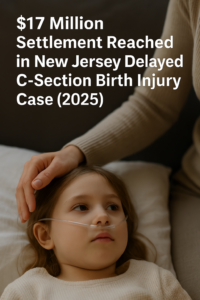
What Happened in the Case Involving Jenna Doucette and Hackensack University Medical Center?
In a major medical malpractice case out of New Jersey, a $17 million settlement was reached in January 2025 after a mother sued her doctor and hospital for a delayed C-section that led to severe birth injuries. Jenna Doucette, the plaintiff, filed the lawsuit against maternal-fetal medicine specialist Dr. Abdulla Al-Khan and Hackensack University Medical Center. The case revolved around the timing of her C-section and the medical decisions made before her daughter’s birth.
Why Was the Lawsuit Filed for the Birth Injury Case?
Jenna Doucette had been diagnosed with placenta percreta, a serious and high-risk condition where the placenta grows too deeply into the uterine wall and can cause life-threatening bleeding during delivery. Because of the risks involved, she was scheduled for a cesarean delivery at 37 weeks of pregnancy—a plan that follows common clinical guidelines.
However, before she could undergo the scheduled surgery, Jenna suffered a uterine rupture, a rare but catastrophic complication. This led to a lack of oxygen (hypoxia) to her unborn daughter Shea during delivery. As a result, Shea sustained severe birth injuries, including hypoxic-ischemic encephalopathy (HIE) and later developed cerebral palsy.
What Was Alleged in the Malpractice Claim?
Jenna’s legal team claimed that the C-section should have been scheduled and performed earlier due to the seriousness of her placenta percreta diagnosis. They argued that the delay constituted medical negligence, and that an earlier delivery could have prevented Shea’s lifelong disabilities.
The lawsuit centered on the idea that the medical providers failed to act quickly enough, despite clear signs that Jenna’s pregnancy was high-risk. The plaintiffs asserted that better planning and earlier intervention might have prevented the uterine rupture and the devastating consequences that followed.
How Did the Defense Respond?
On the other side, the defense argued that the care provided was within the accepted medical standards. They maintained that planning a delivery at 37 weeks for placenta percreta was medically appropriate, and that unforeseen complications like uterine rupture can occur even with careful monitoring.
Their legal team also noted that obstetric medicine often involves balancing risks—particularly with complex conditions like Jenna’s. The defense stood by the clinical judgment exercised by Dr. Al-Khan and the hospital staff, insisting that their decisions were aligned with professional guidelines and best practices in maternal-fetal care.
What Did the Settlement Include?
After prolonged litigation and expert testimonies, the parties reached a $17 million settlement in early 2025. This amount was not just compensation—it was structured to support Shea’s lifelong medical and developmental needs. The settlement includes provisions for:
Ongoing physical and occupational therapy
Specialized medical care and adaptive equipment
Home modifications for accessibility
Educational support and long-term care planning
According to legal experts, such settlements are designed not only to acknowledge harm but also to secure a stable future for children living with birth injuries caused by medical error.
What Are the Broader Implications of This Case?
This case shines a spotlight on the critical importance of timing in high-risk pregnancies—especially when serious conditions like placenta percreta are involved. Obstetricians must constantly weigh when to intervene for the safety of both mother and baby. A delay of even a few days in a condition like this can make the difference between a safe delivery and a tragic outcome.
Medical professionals and hospital systems may see this case as a wake-up call to revisit protocols and ensure earlier interventions are considered in similarly high-risk scenarios. For families, it serves as a reminder to seek second opinions and ask detailed questions when dealing with rare and complex pregnancy diagnoses.
Final Thoughts of The $17 million settlement in Jenna Doucette’s case
The $17 million settlement in Jenna Doucette’s case is one of the largest medical malpractice payouts related to birth injury in New Jersey in recent years. While no amount of money can undo the harm caused, this outcome does ensure that Shea Doucette will receive the resources she needs for the rest of her life.
This story also underscores a broader message: timely action in obstetric care can be lifesaving, and the cost of inaction—both emotionally and financially—can be enormous.
If you want to find the best medical malpractice lawyers near me here are some choices:
1. Mazie Slater Katz & Freeman LLC – Roseland, NJ
Recognized among the Best NJ Medical Malpractice Attorneys by Best Lawyers in America, this firm has secured significant settlements, including an $18.5 million verdict for a child who developed cerebral palsy due to a delayed C-section.
2. Fronzuto Law Group – Woodland Park & Newark, NJ
Specializing in complex pediatric malpractice and birth trauma cases, Fronzuto Law Group has recovered millions in damages for families, including a $3.8 million settlement for an anoxic brain injury.
3. Sokolove Law – Eatontown, NJ
With over 45 years of experience, Sokolove Law has recovered more than $1 billion for families affected by birth injuries. Notable New Jersey settlements include $4.15 million for a child with cerebral palsy and $3.35 million for a mother whose daughter has CP.
4. Eichen Crutchlow Zaslow LLP – Edison, Red Bank & Toms River, NJ
This firm is known for its strong advocacy in birth injury cases, handling claims involving cerebral palsy, Erb’s palsy, and hypoxia. They work with leading medical experts to uncover medical negligence and have a track record of successful settlements and verdicts.
5. O’Connor, Parsons, Lane & Noble LLC – Westfield, NJ
This firm has achieved some of the largest birth injury verdicts in New Jersey, including a $28 million verdict for failure to disclose an unborn infant’s catastrophic genetic defect and a $7 million settlement for a delayed C-section causing fetal brain injury.
